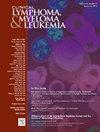SOHO 最新进展和下一个问题 | BCR::ABL1-Like急性淋巴细胞白血病的治疗方法。
IF 2.7
4区 医学
Q2 HEMATOLOGY
引用次数: 0
摘要
费城样(Ph-like)或BCR::ABL1样急性淋巴细胞白血病(ALL)是B细胞前体ALL(B-ALL)的一种常见高危亚型,其特点是存在多种多样的遗传改变,给诊断带来挑战,并汇集了不同的激酶和细胞因子受体激活的基因表达谱,与BCR::ABL1阳性ALL的基因表达谱相似,而BCR::ABL1阳性ALL正是其命名的来源。激酶激活基因驱动因素的存在促使人们在临床前模型和临床环境中研究基于酪氨酸激酶抑制剂(TKI)的治疗方法的疗效。传统化疗反应不充分、诱导失败率高、可测量残留疾病(MRD)持续阳性等因素进一步证实了这一点,与其他 B-ALL 亚型相比,这些因素导致患者的生存率较低。因此,目前正在采用创新方法,包括将 TKIs 与一线治疗方案相结合,以及尽早引入免疫疗法策略(单克隆抗体、T 细胞吞噬剂、药物共轭物和 CAR-T 细胞)。异基因造血细胞移植(HSCT)目前被推荐用于首次完全缓解的成人BCR::ABL1样ALL患者。然而,新型疗法的采用、更准确的诊断和更灵敏的 MRD 评估可能会改变这些患者的风险分层和移植指征。本文章由计算机程序翻译,如有差异,请以英文原文为准。
SOHO State of the Art Updates and Next Questions | Approach to BCR::ABL1-Like Acute Lymphoblastic Leukemia
Philadelphia-like (Ph-like) or BCR::ABL1-like acute lymphoblastic leukemia (ALL) is a common high-risk subtype of B-cell precursor ALL (B-ALL) characterized by a diverse range of genetic alterations that challenge diagnose and converge on distinct kinase and cytokine receptor-activated gene expression profiles, resembling those from BCR::ABL1-positive ALL from which its nomenclature. The presence of kinase-activating genetic drivers has prompted the investigation in preclinical models and clinical settings of the efficacy of tyrosine kinase inhibitor (TKI)-based treatments. This was further supported by an inadequate response to conventional chemotherapy, high rates of induction failure and persistent measurable residual disease (MRD) positivity, which translate in lower survival rates compared to other B-ALL subtypes. Therefore, innovative approaches are underway, including the integration of TKIs with frontline regimens and the early introduction of immunotherapy strategies (monoclonal antibodies, T-cell engagers, drug-conjugates, and CAR-T cells). Allogeneic hematopoietic cell transplantation (HSCT) is currently recommended for adult BCR::ABL1-like ALL patients in first complete remission. However, the incorporation of novel therapies, a more accurate diagnosis and a more sensitive MRD assessment may modify the risk stratification and the indication for transplant in these patients.
求助全文
通过发布文献求助,成功后即可免费获取论文全文。
去求助
来源期刊

Clinical Lymphoma, Myeloma & Leukemia
ONCOLOGY-HEMATOLOGY
CiteScore
2.70
自引率
3.70%
发文量
1606
审稿时长
26 days
期刊介绍:
Clinical Lymphoma, Myeloma & Leukemia is a peer-reviewed monthly journal that publishes original articles describing various aspects of clinical and translational research of lymphoma, myeloma and leukemia. Clinical Lymphoma, Myeloma & Leukemia is devoted to articles on detection, diagnosis, prevention, and treatment of lymphoma, myeloma, leukemia and related disorders including macroglobulinemia, amyloidosis, and plasma-cell dyscrasias. The main emphasis is on recent scientific developments in all areas related to lymphoma, myeloma and leukemia. Specific areas of interest include clinical research and mechanistic approaches; drug sensitivity and resistance; gene and antisense therapy; pathology, markers, and prognostic indicators; chemoprevention strategies; multimodality therapy; and integration of various approaches.
 求助内容:
求助内容: 应助结果提醒方式:
应助结果提醒方式:


